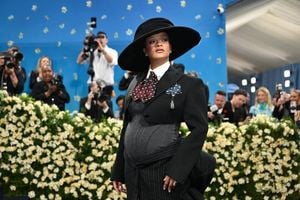As the dust settles on the 2025 Federal Election, the results reflect a significant shift in the Australian political landscape, with the Labor Party making substantial gains across key seats. This election, held on May 6, 2025, saw Labor not only retaining but also gaining ground in various electorates, marking a notable moment in Australian politics.
In New South Wales, Labor achieved a remarkable victory in the Banks seat, flipping it from the Liberals, previously held by David Coleman. This win, along with other notable results, underscores Labor's strong performance in the state. The Bennelong seat, once a Liberal stronghold, was retained by Labor's Jerome Laxale, who faced a notional challenge from the opposition.
Meanwhile, the race in Bradfield remains too close to call, with Liberal candidate Gisele Kapterian slightly ahead of Teal independent challenger Nicolette Boele. In Calare, Independent Andrew Gee successfully retained his seat, while the Nationals held on to Cowper with Pat Conaghan.
Labor's Emma McBride retained the Dobell seat, and Fiona Phillips also secured victory in Gilmore, both reflecting positive swings towards the party. Other significant Labor retains included seats held by Justine Elliot in Richmond and Meryl Swanson in Paterson, demonstrating the party's resilience in traditionally competitive areas.
In the Northern Territory, Marion Scrymgour retained her seat of Lingiari for Labor, while Queensland saw even more dramatic shifts. Labor gained the Brisbane seat from the Greens' Stephen Bates and also picked up Bonner from the Liberal-National Party's Ross Vasta. Notably, Peter Dutton, the opposition leader, became the first sitting leader in Australian history to lose his seat, as Labor's candidate won Dickson.
Griffith also returned to Labor's fold, with a significant victory over the Greens' Max Chandler-Mather, while Labor capitalized on the retirement of Warren Entsch to claim Leichhardt.
In South Australia, Labor retained the Boothby seat and gained Sturt from the Liberals, further solidifying their presence in the region. Tasmania saw Labor making gains as well, with Anne Urquhart winning Braddon and the party taking Bass from the Liberals.
Victoria presented a mixed bag, with Labor retaining Aston, Bruce, and Chisholm, while also gaining Deakin from the Liberals. However, the Liberal Party managed to hold on to Casey, providing a glimmer of hope amid a challenging night.
As the election results continue to unfold, some seats remain too close to call, notably in Victoria's Goldstein and New South Wales' Ryan. The outcomes in these electorates could further influence the balance of power in the coming days.
However, not all news was positive for the Liberal Party. In a significant development, the party is currently embroiled in a dispute with the Australian Electoral Commission (AEC) over an election night error in the Menzies seat. Initially, Liberal candidate Keith Wolahan was reported to have received about 1,800 votes more than what was confirmed in a recount, leading to concerns about the integrity of the election process. Labor's Gabriel Ng secured a 0.34 per cent swing on a two-party preferred basis, placing Wolahan in a precarious position.
The recount in Menzies revealed a drop of 1,851 votes for Wolahan, which has sparked scrutiny and questions about the electoral process. An AEC document indicated that Wolahan initially received 8,817 votes at a booth in Doncaster East, but the recount showed this number fell to just 6,996. This discrepancy has raised eyebrows, although the AEC characterized it as a “transcription error” that was quickly rectified during the scrutiny process.
Former Nationals leader Michael McCormack reflected on the history of recounts in Australia, noting the first recount in his own seat of Riverina back in 1903. He expressed concerns about the high number of informal votes, suggesting the need for uniformity in voting processes across local, state, and federal elections. McCormack emphasized the importance of ensuring that every vote counts, especially given the historical sacrifices made for democratic rights.
The 2025 Federal Election results indicate a significant shift in voter sentiment, with Labor making substantial gains and the Liberal Party facing challenges in key areas. As recounts and disputes continue, the final tally will ultimately shape the direction of Australian politics for the foreseeable future.




